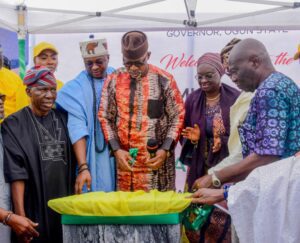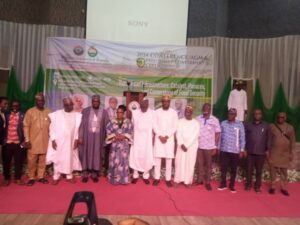
Making Diaspora the centerpiece of Nigeria’s foreign policy and sustainable development agenda
By Femi Odere
For a developing (some would argue that she’s still underdeveloped) nation like Nigeria, it’s befuddling, to say the least, that the country’s Diaspora population, which has been documented to have the highest percentage in higher education among global Diaspora population are not given any place in the country’s foreign policy formulation, not to talk of being factored into her sustainable economic development paradigm.
Although this piece is an attempt to make a case for the inclusion of Nigerians in Diaspora, based on hard facts and incontrovertible evidence, into the country’s foreign policy and sustainable economic development agenda, it is important, however, to take a glimpse into the past in order to understand what must be done in the present so as to be deliberate in creating the kind of future we desire as a country.
There are perhaps several factors why Nigerian diasporic citizens are never seen by our leaders and policy makers as the fulcrum around which the nation’s foreign policy and development efforts should revolve. But three major impediments, it seems to me, stands out in this foreign policy faux pas.
Firstly, unlike most countries of the world, Nigeria’s development efforts has never been centered around her citizens. The people have always been on the bottom of the nation’s development totem pole. Yet, two sub-factors can be adduced to this anomaly. These are the discovery of crude oil and military incursion into the body politic.
While there’s nothing inherently wrong with the discovery of crude oil as other nations that discovered this commodity had used it to unleash their creative thinking and catapulted themselves into modernity as we know it in terms of value addition to this commodity, the discovery of crude oil seems to have deadened our leaders’ ability to think creatively so that the country could become relatively developmentally independent. Instead, they have turned the country’s economy into a rentier one.
In fact, the rentier economy became awash with so much money at some point that a military ruler quipped, perhaps in a state of ecstasy, that “money is not our problem, but how to spend it” whereas if he had been a serious thinking, futuristic and creative ruler he would have said something to the effect that “money is not our problem, but how to make things.”
Although it can be argued that the military came at a time when the production capacity of the nation was basically unformed, the fact remains that, by its very nature, the military cannot train people to be productive. They can only train to kill. What is more, it’s impossible to train people you disdain so much to the extent of calling them “bloody civilians” as if they’re the ones that are trained to kill.
Secondly, our leaders and policy makers have a poor understanding of foreign policy and what it is supposed to produce. A county’s foreign policy is an extension of her domestic policy. And since domestic policy is intrinsically tied to the security of life and property of the citizens of that country as well as ensuring prosperity and life more abundant for her greatest number, it goes without saying that the country’s foreign policy must necessarily follow the same security-guarantee, prosperity-enhancing and abundance trajectory. That has always been the fundamental objectives and directive principles of any nation worth her name and reputation since time immemorial.
As a result of this immutable reality, countries are always deliberate in the kind of foreign policy they craft that will increase the comparative advantage of their people and provide for them more opportunities in their host countries as well as being able to plow back their financial proceeds for the development of the home front.
Since evidences abound that Nigerian leaders have made mincemeat of the country’s domestic policy in the first instance, it also goes without saying that her foreign policy cannot be any better. And since her foreign policy is wooly at best, her Diaspora population will likely be in the First Line Charge of the collateral damages that must necessarily accompany this major foreign policy blunder, which is why Nigerians are given short shrift around the world.
Thirdly, since today’s policy makers do not have a good understanding of what the nation’s foreign policy should produce, it also follows that they do not understand, or chose not to understand, the country’s Diaspora population in terms of what this upwardly mobile, high net worth and highly educated critical mass can bring to the country’s development table.
One example of lack of this understanding will suffice here.
At a sitting of the House of Representatives on March 10, 2021, Hon. Mark Terseer Gbillah, representing Gwer East/West Federal Constituency of Benue State, after he had been recognized to speak by the Deputy Speaker Hon. Ahmed Idris Wase (because he presided over plenary of the House on that day), stood up and said he wanted to present a petition to the House. This petition emanated from the Mutual Union of Tivs in America (MUTA), a Diaspora association. The association had petitioned the federal government against a backdrop that their ancestral lands are being attacked incessantly, forcing their people from their homes and the lands gradually being taken over by the marauders.
Hon. Wase queried the locus standi of this association in presenting a petition on a matter he said “they are not familiar with since they live abroad.”
“Honourable Gbillah, did you say Tivs in America? If they are in America, could they really be an interested party here? Could they really know exactly what is going on?” Wase pointedly asked Gbillah.
As if the above comments was not damning and embarrassing enough, Wase said, “it would be different if the petition was presented by Nigerians living in Nigeria” because “they cannot be sitting in the comfort of their house in America and be writing petition against Nigeria.” Wase even asked Gbillah if the association registered with the “Corporate Affairs of Nigeria” as if that should be the latter’s business. He meant to say Corporate Affairs Commission. Wase said he’s “not convinced” they should write petitions despite Gbillah’s attempt to educate him to the contrary, citing petitions of local and international organizations that were presented in the House in the past. It doesn’t get any more clueless than that.
This odious display of lack of understanding by the Deputy Speaker of a lower chamber of a country’s legislature not only brings into the fore the lack of understanding of the fiduciary duty of this lawmaker, but speaks to our country’s leadership selection process in which it can be argued that Wase, perhaps like some (if not most) of his colleagues, may not have a good and appreciable grasp of the grundnorm of development and the legislative processes that undergirds it, let alone having the presence of mind to identify the critical building blocks that are necessary for societal development.
The imperative of Nigerians in Diaspora as a subset, if not a cornerstone, of the nation’s foreign policy and sustainable development agenda cannot be underestimated.
According to the 2017 records of the United Nations (UN), there are 1.24 million migrants from Nigeria in Diaspora. One needs not be told that this figure then, and even now, is miniscule if illegal migration, which is probably more than legal and legitimate outflow of Nigerians, is factored into the UN statistics.
The then Senior Special Assistant to the President on Foreign Affairs and the Diaspora, Hon. (Mrs.) Abike Dabiri-Erewa, had said, in the same 2017 year that the UN updated its records, that there are about 15 million Nigerians in various parts of the world.
In a special report of Nigeria @60 by the Financial Times, it says “in the US, Nigerians are the most highly educated of all groups, with 61 per cent holding at least a bachelors degree compared with 31 per cent of the total foreign-born population and 32 per cent of the US-born population,” according to a 2017 data from the Migration Policy Institute.
The newspaper went further to say that “more than half of Nigerian immigrants (54 per cent) were most likely to occupy management positions, compared with 32 per cent of the total foreign-born population and 39 per cent of the US-born population.”
Their collective net worth, by way of their remittances, was also backed by statistics from world institutions and development experts. In the Punch of 23rd August 2021 “the Nigerian Diaspora population remitted $65.34bn in three years to boost economic activities in the country” quoting a data obtained from the World Bank. According to the newspaper, “the Nigerian Diaspora remittance was $24.31bn in 2018; it dropped to $23.81bn in 2019; and in 2020, fell to $17.21bn.” The inflow of these remittances, particularly in 2020, was four per cent of the country’s Gross Domestic Product (GDP), a very significant percentage indeed.
By the same token, the remittances in these three year period was said to be 11 times more than the Foreign Direct Investments (FDI) that both the federal and subnational governments are always falling over themselves to attract—-even with stringent conditions. Yet, our leaders have never really thought it fit to craft mutually beneficial policies to pluck the low hanging fruits of the human and financial resources of our Diaspora population.
One is also curious as to why state governments, whose indigenes are responsible for these remittances in the first place, are not asking for their own cuts from the two-layered remittance charges, which in itself runs into billions of dollars, that commercial banks and remittance companies charge remitters. One tenth of one percent of these charges, if given to states, can dwarf the monthly federal allocations of most of these states. Since they didn’t ask, the banks and other remittance companies cannot be under any obligation to give the states what’s probably their legitimate dues and earnings.
It can also be argued that the Federal Government did well to have created the Nigerians in Diaspora Commission (NiDCOM) by signing the Establishment Bill into law in July 2017 after ten years that it was perhaps kept in the legislative cooler. But better late than never.
Considering the above hard economic statistics and other critical factors that are in the possession of Nigerians in Diaspora for economic development coupled with our eagerness for accelerated development, one would have thought that a Federal Ministry of Diaspora would have been a foregone conclusion by now.
Most of the developed countries of the world, at the infancy of their development, had used their Diaspora population as catalysts for their economic emancipation. The creation of the Diaspora Division in the Africa Union was not for window dressing. It’s a Division that serves as the focal point and hub for “implementing the African Union decision to invite and encourage the African Diaspora to participate in the building and development of the African continent” which member African nation-states are expected to domesticate for their economic developments.
The nation of Israel is a non-African “First World” country, and it will remain so into the foreseeable future. The country, with her development indices that are “first class,” still has a Ministry of Diaspora Affairs with a full-time Minister. One is therefore at a loss why Nigeria, fundamentally an underdeveloped country desperately grasping for breath in all areas of development, has not thought it fit to not only create a full fledge Ministry for her Diaspora population, but having difficulty, at the minimum, to reach out to her diasporic citizens for her development objectives. But someone, of recent, understood the importance of reaching out to her Diaspora and reaped bountifully afterwards.
Prof. Olayinka Olusola Omigbodun is the Provost of the College of Medicine, University of Ibadan. Sometimes this year, she realized that she has a big problem on her laps. The problem was how to find support for the building of a hostel and other structures for the students of the College. So, she thought outside the box and reached out to the alumni of the College for support through a fundraising. An alumnus of the College of Medicine, Philip Ozuah who’s now a successful Nigerian doctor in the United States, donated One Million Dollar in one fell swoop.
This huge donation and that of other alumni would undoubtedly make all the difference in seeing the UI College of Medicine student hostel into full completion. What if Prof. Omigbodun had not been creative in her thinking. Would these monies, from the College of Medicine alumni, have dropped into her laps? Most certainly not. And there are hundreds of Philip Ozuahs still out there who could make similar contributions both in cash and kind to Nigeria if only their governments, both at the federal and subnational levels, would recognize them, and, with honesty and sincerity of purpose, ask them for support in their development initiatives.
In his countrywide consultations with relevant stakeholders in the run up to the APC presidential primaries, Asiwaju Bola Ahmed Tinubu came to Ekiti State. In his speech before the state’s traditional rulers in the presence of the governor and some of his aides at the palace of the Ado-Ekiti monarch, the now APC presidential candidate said that the doctor who operated on his knees in the UK is from Ekiti State. Tinubu promised his audience that he would bring this Ekiti orthopedic surgeon back to Nigeria when he becomes Nigeria’s president to contribute his quota to the development of the country’s health system.
One hopes that he would accept this invitation. And even if he decline the invitation, there’s no telling this Ekiti son might perhaps have a million Pound Sterling sitting pretty in his UK bank account that he’s still trying to figure out what to do with it. It just might be given to his government if he’s asked. It is only when his government reaches out to him that it truly needs help (which it does) through specifically targeted policies and programmes can he do what Philip Ozuah did for his alma mater. It’s only the child that raises his hands that his mother would feel obliged to carry. It is therefore high time that Nigeria and her subnationals raise their hands to their Diaspora citizens for the needed assistance in this business of nation building in which all hands must be on deck.



